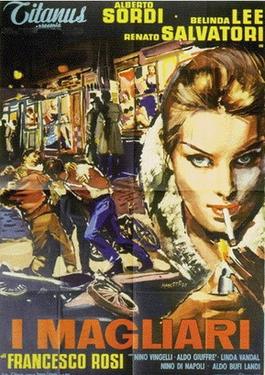List of West German films of 1959. Feature films produced and distributed in West Germany in 1959.
List of West German films of 1959. Feature films produced and distributed in West Germany in 1959.

The film industry in Germany can be traced back to the late 19th century. German cinema made major technical and artistic contributions to early film, broadcasting and television technology. Babelsberg became a household synonym for the early 20th century film industry in Europe, similar to Hollywood later. Early German and German-speaking filmmakers and actors heavily contributed to early Hollywood.

Douglas Sirk was a German film director best known for his work in Hollywood melodramas of the 1950s. However, he also directed comedies, westerns, and war films. Sirk started his career in Germany as a stage and screen director, but he left for Hollywood in 1937 after his Jewish wife was persecuted by the Nazis.
New German Cinema is a period in West German cinema which lasted from 1962 to 1982, in which a new generation of directors emerged who, working with low budgets, and influenced by the French New Wave and Italian Neorealism, gained notice by producing a number of "small" motion pictures that caught the attention of art house audiences. These filmmakers included Percy Adlon, Harun Farocki, Rainer Werner Fassbinder, Peter Fleischmann, Werner Herzog, Alexander Kluge, Ulli Lommel, Wolfgang Petersen, Volker Schlöndorff, Helma Sanders-Brahms, Werner Schroeter, Hans-Jürgen Syberberg, Margarethe von Trotta and Wim Wenders. As a result of the attention they garnered, they were able to create better-financed productions which were backed by the big US studios. However, most of these larger films were commercial failures and the movement was heavily dependent on subsidies. By 1977, 80% of a budget for a typical West German film was ensured by a subsidy.
Polish Film School refers to an informal group of Polish film directors and screenplay writers active between 1956 and approximately 1963. Among the most prominent representatives of the school are Andrzej Wajda, Andrzej Munk and Jerzy Kawalerowicz.
This is a list of the most notable films produced in cinema of Germany.

The International Short Film Festival Oberhausen, founded in 1954, is one of the oldest short film festivals in the world. Held in Oberhausen, it is one of the major international platforms for the short form. The festival holds an International Competition, a German Competition, an International Children's and Youth Film Competition, the MuVi Award for best German music video, and, since 2009, the NRW Competition for productions from the German state of North Rhine-Westphalia.

Victor Tourjansky, born Vyacheslav Konstantinovich Turzhansky, was a Russian actor, screenwriter and film director who emigrated after the Russian Revolution of 1917. He worked in France, Germany, Italy, and the United States.
Arthur Maria Rabenalt was an Austrian film director, writer, and author. He directed more than 90 films between 1934 and 1978. His 1958 film That Won't Keep a Sailor Down was entered into the 1st Moscow International Film Festival. Two years later, his 1960 film Big Request Concert was entered into the 2nd Moscow International Film Festival. His career encompassed both Nazi cinema and West German productions. He also wrote several books on the 1930s and 1940s wave of German cinema.

I magliari is a 1959 Italian drama film directed by Francesco Rosi. The film won the silver ribbon for best cinematography.
Walter Wischniewsky was a German film editor who worked on over a hundred productions during his career. Wischniewsky also sometimes worked as an assistant director. Wischniewsky began his career during the Nazi era, but most productions he worked on were post-Second World War. He edited several rubble films, including The Berliner (1948). During the 1950s and 1960s he became one of the mainstays of German commercial cinema, working on the long-running Edgar Wallace and Karl May series. Wischniewsky edited Fritz Lang's Indian-shot The Indian Tomb and The Tiger of Eschnapur.
Mistress of the World is a 1960 multinational European science fiction spy film remake of the 1919 eight-part silent film The Mistress of the World directed by William Dieterle and starring Martha Hyer and Carlos Thompson. It marked the comeback in his native country of the director William Dieterle after several decades spent in Hollywood. In West Germany, it was released in a longer version split in two parts.